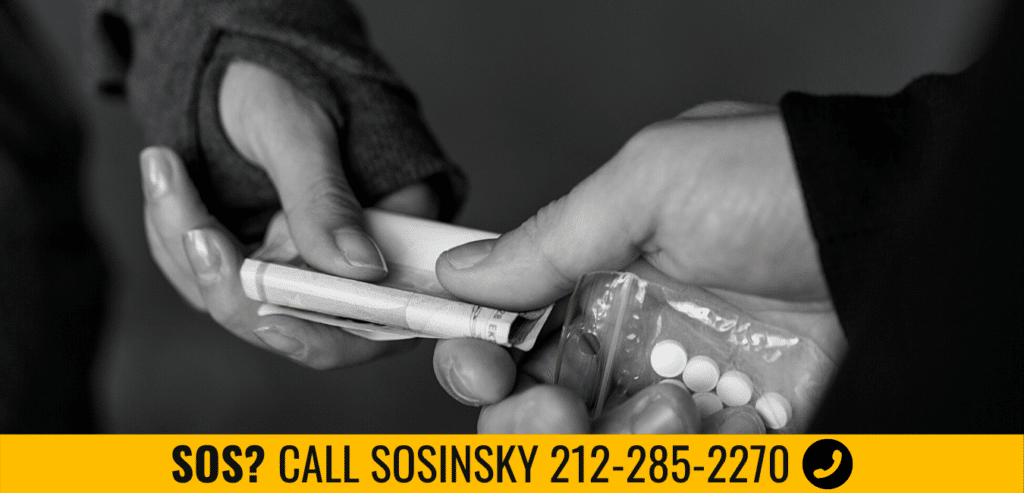NYC Drug Distribution Lawyer
Drug Distribution Lawyer in New York City
New York may be regarded as a liberal place to many people, but when it comes to illegal drugs, New York can be one of the toughest places in the country. As harsh as a punishment may be for possessing unlawful controlled substances in New York if you are accused of selling that same drug, the stakes could not be higher. By way of example, if you are found to have simply possessed a small amount of heroin, cocaine, or other drugs which it appears you had for personal use, you likely will be charged only with a misdemeanor crime of criminal possession of a controlled substance in the seventh degree. If handled properly by an experienced NYC drug distribution lawyer, you may well escape from that scenario without a permanent criminal record. However, if the police claim that you gave that same small quantity of illegal drugs to another person you will likely face very significant drug distribution charges which can land you in state prison — even if you are a first time offender and more surprising even if you did not get paid for the drugs. That is right: for many types of drugs, a passing of even a minimal quantity of that drug may allow draconian charges of criminal sale of a controlled substance to be leveled against you and place you at risk of very serious consequences. Depending on the drug and quantities involved and whether there was a school ground nearby, there may even be mandatory minimum prison sentences that may come into play. And despite the existence of drug treatment courts and other efforts at diversion, for many these programs are not available or the panacea that they are thought to be.
If you or a loved one have been charged with criminal sale of a controlled substance in New York, you will need to have a top-flight NYC drug distribution lawyer fighting for you. One who has had many years of experience aggressively representing individuals facing drug sale charges in New York — and winning not guilty verdicts, suppression hearings, getting drug sale cases dismissed and, where negotiation is called for, gaining great plea bargains for his clients. With more than 30 years of success for hundreds of clients charged with narcotics sales in New York, you would be hard-pressed to find another attorney who can match the litigation skills, smarts, strategic thinking, and personal attention that NYC drug distribution attorney Fred Sosinsky will provide you and your family. Whether the case involves charges that you sold a small quantity of controlled substances to an undercover police officer, half an ounce to a confidential informant, 20 pills to an uncharged buyer, or are part of a large, multi-defendant conspiracy or hundred kilo a month drug organization, Fred Sosinsky will expertly represent you. Fred has been involved in cases involving the largest single seizure of heroin in NYC history and many other large scale, long-term drug sale investigations where police use wiretaps, search warrants, and other tools to build their cases. Fred has tried and won months-long narcotics conspiracy trials and in other cases convinced judges to throw out from court significant quantities of cocaine, heroin, and other drugs by demonstrating police misconduct. From a college student cleared of marijuana possession charges to a drug kingpin able to serve just a minimal term in jail, Fred Sosinsky knows the importance of every drug sale case to his clients. Regardless of the drug or quantity involved, Fred Sosinsky will put his talents to work for you.
If you have been arrested and charged with criminal sale of a controlled substance crime, NYC drug distribution lawyer Fred Sosinsky will work tirelessly to win the case or to get you the very best possible resolution. His results in drug cases – and his former clients — speak for themselves.
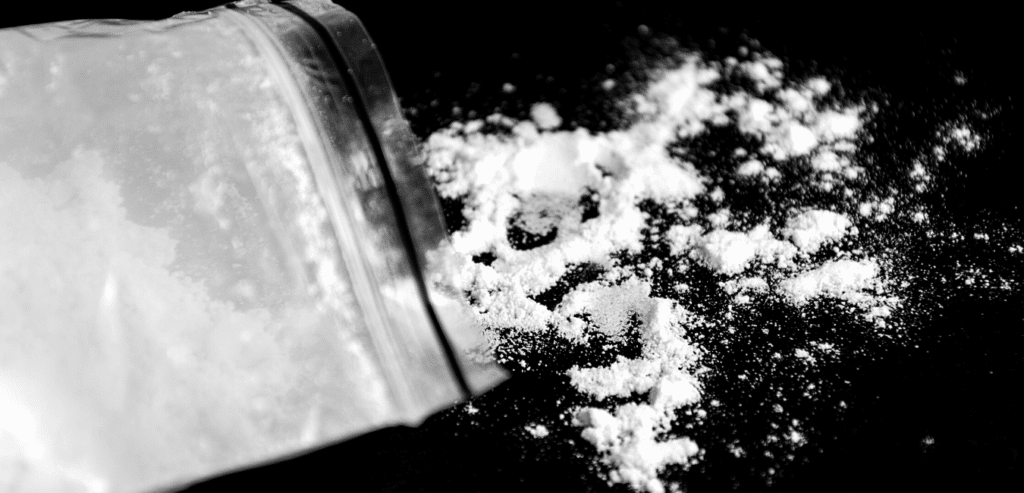
What is a Sale of Drugs Under New York Law?
You might think that in order to be charged with making a sale of a controlled substance in New York, there must be evidence that you provided drugs to another in exchange for money. However, the very definition of sale under the law here does NOT require that an exchange take place. Rather, New York permits a charge of criminal sale of a controlled substance to be brought not only where there is such an exchange but also where it is simply given or transferred or disposed of by providing it to another and even where it is agreed to do so but has not yet occurred. As can be seen, this law could allow police to charge someone with a drug sale even where they simply hand a small quantity of that drug to a friend or family member Indeed, Fred Sosinsky has seen cases charging sale with no evidence of an exchange of funds for the drugs.
Criminal Sale of a Controlled Substance in New York
In New York, the criminal laws that make it illegal to sell drugs are almost all referred to as “Criminal Sale of a Controlled Substance”. Thus, what may commonly be referred to as “dealing”, “distributing” or “moving” drugs, etc. are subsumed under the “Criminal Sale” heading.
New York criminalizes substances that appear on lists or Schedules of Controlled Substances. There are five Schedules of such drugs with the first, Schedule I, containing those substances which are always unlawful to possess and sell and which are traditionally the most subject to abuse and addiction. As one moves down the Schedules, other drugs are found which may have recognized medical uses and for which a physician may provide a valid prescription to possess for use. Obviously, whether or not one has a valid prescription for a controlled substance, it is illegal to sell that drug to another person, and often enough, arrests in narcotic sales cases involve charges that a person who may have had a perfect right to possess a prescribed medication passed or gave or sold that medication to another.
In New York, the degree or severity of the controlled substance sale charged is based upon the type of drug involved, the quantity of that drug which is sold, and whether the accused has previously been convicted of a similar drug crime. While, as noted above, selling any quantity of a controlled substance permits serious felony charges to be brought, for certain substances, a sale of a small quantity can result in a much higher degree of crime than for others. Therefore, if you’re facing any kind of drug charges, it’s best to speak with an expert NYC drug sale lawyer right away.
Criminal Sale of a Controlled Substance in the Fifth Degree
Criminal Sale of a Controlled Substance in the Fifth Degree is a Class D felony offense punishable by up to two and one-half years in prison. You may be charged with Criminal Sale of a Controlled Substance in the Fifth Degree in New York if you knowingly and unlawfully sell any controlled substance. So long as the drug involved is found on any of the five Schedules of controlled substances in New York, the sale of any quantity of that drug whatsoever is a felony.
Criminal Sale of a Controlled Substance in the Fourth Degree
Criminal Sale of a Controlled Substance in the Fourth Degree is a Class C felony punishable by up to five and one-half years in prison. You may be charged with Criminal Sale of a Controlled Substance in the Fourth Degree in New York if you knowingly and unlawfully sell among other things certain narcotics preparations as that term is defined in the law, methadone, 4000 or more mg of Ketamine, concentrated cannabis, or a controlled substance on school property.
Criminal Sale of a Controlled Substance in the Third Degree
Criminal Sale of a Controlled Substance in the Third Degree is a Class B felony punishable by up to nine years in prison. You may be charged with Criminal Sale of a Controlled Substance in the Third Degree in New York if you knowingly and unlawfully sell among other things a narcotic drug as that term is defined in the law, a narcotic preparation as that term is defined in the law to a person under the age of 21, hallucinogens, LSD and PCP of modest weight, and methamphetamine of one-eighth of an ounce or more.
Criminal Sale of a Controlled Substance in the Second Degree
Criminal Sale of a Controlled Substance in the Second Degree is a Class A-II felony punishable by up to ten years in prison and a mandatory minimum sentence of three years in prison. You may be charged with Criminal Sale of a Controlled Substance in the Second Degree in New York if you knowingly and unlawfully sell among other things a half-ounce or more of a narcotic drug as that term is defined in the law, hallucinogens, LSD, and PCP of somewhat greater weight, a half-ounce or more of methamphetamine and 360 mg or more of methadone.
Criminal Sale of a Controlled Substance in the First Degree
Criminal Sale of a Controlled Substance in the First Degree is a Class A-I felony punishable by up to twenty years in prison with a mandatory minimum sentence of eight years in prison. This is one of the most serious charges that may be brought against anyone in the State of New York. You may be charged with Criminal Sale of a Controlled Substance in the First Degree in New York if you knowingly and unlawfully sell two ounces or more of a narcotic drug as that term is defined under the law, 2880 mg or more of methadone.
As can be seen, in order to be charged with this highest level drug sale crime, you need not be a drug kingpin or a major player in the drug trade. If a sale involves two ounces of the kind of drugs that are most commonly present on the streets of NYC, you will be staring down at least 8 years in prison if you do not have a skilled and talented NYC drug defense attorney in your corner.
Operating as a Major Trafficker
Several years ago, New York enacted a new law intended to provide even greater punishment for those who were convicted of involvement in the highest levels of drug distribution. The legislature created a so-called “drug kingpin” statute which provided for increased prison sentences for those that came within its ambit. These charges are incredibly serious and carry harsh penalties if convicted. If your drug charges have the potential to classify you as operating as a major drug trafficker, it’s advised to speak with a top NYC drug possession lawyer right away.
Operating As A Major Trafficker is a Class A-I felony offense punishable by up to life in prison with a mandatory minimum sentence of fifteen years in prison for a first offender. A person may be charged with this offense when he/she acts as a “director” of a controlled substance organization during a period of twelve months or less during which the organization sells drugs and the proceeds either collected or due to be collected are $75,000 or more, or as a “profiteer” as that term is defined in the law, he/she sells or possesses with the intent to sell on one or more occasions within six months or less narcotic drugs and the proceeds collected or due to be collected or the value of the drugs are $75,000 or more.
The term “controlled substance organization” means a group of four or more participants who share a common goal or purpose of engaging in drug sales in violation of the law. “Director” as it is used in the drug kingpin statute means someone who is either the principal administrator, organizer, or leader of a controlled substance organization or one of several such persons. The term “profiteer” as it is used in the drug kingpin statute means a director of the organization, a member of the organization who has managerial responsibility for others, or a person who arranges or plans drug transactions so as to obtain profits. Under this law, a person is not a “profiteer” if he or she acts only as an employee, acts as an accommodation to a friend or a relative, or acts only under the direction or control of others and exercises no substantial, independent role in arranging or directing the transactions in question.
NYC drug possession lawyer, Fred Sosinsky has found prosecutors to be overcharging individuals with this “drug kingpin” crime in an effort to have them turn on their alleged associates and assist law enforcement to beef up cases against those thought to have greater culpability. Bringing a strong legal challenge to the accusation of being a major drug trafficker often has forced prosecutors and courts to reduce charges enabling a case to be resolved in a favorable manner.
Criminal Sale of A Controlled Substance In or Near School Grounds
In recent years, New York has upped the ante for those who are found to have made drug sales while on or nearby school or daycare grounds. For anyone who engages in a sale of a controlled substance on or within 1000 feet of a school or daycare facility, including ballfields, playgrounds, sidewalks, and other areas abutting these type of buildings, the sale will be charged as a Class B felony offense punishable by up to nine years in prison.
Criminal Sale of A Controlled Substance to a Child
New York has also recently added a heightened punishment for those who sell a controlled substance to a person who is less than 17 years old. If a person 21 years of age or older sells a controlled substance to anyone who is under the age of 17, the sale will be charged as a Class B felony offense punishable by up to 9 years in prison, regardless of the substance involved.
Seek Help From An NYC Drug Distribution Lawyer
First, drug sale charges in New York may depend in whole or in part upon the testimony of individuals who themselves have been arrested and charged with serious narcotics offenses and who are attempting, through their assistance with the police and prosecutors, to “work off” their charges. Under these circumstances, these “cooperating witnesses” may have very understandable reasons to exaggerate, fabricate or lie about an accused’s alleged involvement in a controlled substance sale case. For more than 30 years, Brooklyn drug distribution lawyer Fred Sosinsky has delivered text-book cross-examinations of such interested witnesses demonstrating to juries time and again the healthy skepticism they should have when evaluating such testimony. Rather than rely on such witnesses’ sworn accounts, Fred has convinced many a jury to reject such testimony as unworthy of belief.
Second, if the case is based upon police testimony alone, Fred Sosinsky has won not guilty verdicts for his clients in drug sale cases by showing that police officers, detectives, or other investigators who testified at trial were not honest in their accounts of what they claim to have seen or heard. Through meticulous preparation and skillful cross-examination of law enforcement witnesses, Fred Sosinsky has destroyed the credibility of prosecution witnesses and made reliance upon their sworn statements unreasonable if not impossible.
Third, if there was a police search of either the accused or the accused’s vehicle or residence and drugs or other evidence of a narcotics sale were recovered, Fred Sosinsky will challenge the right of the police to have stopped, searched, and seized the evidence. If the police had no warrant to conduct a search of a car, an apartment, garage, or storage unit, there may be successful challenges made to the search. Even where law enforcement claims that they had an emergency justifying a warrantless search of a house or room, Fred may be able to show there was no such circumstance present. Fred can challenge a search which the police assert was conducted after acquiring consent by showing that such consent was merely acquiescence to a police show of force. And even those searches carried out after police get a warrant may be litigated and evidence suppressed based on lack of probable cause and lies and misstatements contained in the warrant application.
Fourth, there may be evidence that the police used unreasonable methods or pressure to encourage a person to engage in a narcotics sale when, absent such conduct or pressure, the person was unlikely to have done so. In such cases, an entrapment defense may be viable and lead to an acquittal. This is especially so if the accused has no history of engaging in similar conduct.
Fifth, under the law in New York, if it can be shown that a person accused of a drug sale was merely accommodating or helping a drug purchaser to obtain drugs rather than assisting or aiding the actual seller of the drugs, there may be a successful “agency” defense to be asserted. Fred Sosinsky has won trials for clients in Brooklyn, Manhattan, Queens, and the Bronx where there were significant questions raised as to the role and intent of his client in participating in a drug transaction. Working with the drug distribution lawyer New York City residents trust provides you the best opportunity for a positive outcome in your case.
Finally, a winning challenge to chain of custody or police laboratory work involved in a drug prosecution may be brought. Often enough, reasonable doubts premised upon inconsistencies and errors in police paperwork may be raised about the drugs in question . It may also be the case that there is a material dispute about the make up or weight of a controlled substance.
Drug Treatment for Clients With Dependency or Addiction Issues
In New York, depending on the level of drug sale charge one is facing, there are programs available to those in need that may not only offer life-changing aid in breaking a cycle of abuse and dependency but also life-altering benefits in terms of reduction or dismissal of serious drug charges — assuming one successfully completes such programs. But the requirements to be admitted to these diversion programs and the dangers to the accused should they fail to successfully complete the program may not always be worth the risk. Stated simply, Drug Courts and the guilty pleas which they often require for entry, are not the answer for everyone.
Contact The Top NYC Drug Distribution Lawyer Today
The bottom line: being charged with the sale of controlled substances in New York is no joke. If you find yourself accused of this crime, you will need the most seasoned and skilled NYC drug distribution lawyer you can find to fight these charges. For the highest-quality representation on an NYC drug sale case, give criminal defense attorney Fred Sosinsky a call.
SOS? CONTACT SOSINSKY
NYC Criminal Defense
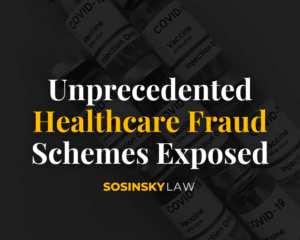
Unprecedented Healthcare Fraud Schemes Exposed
Unprecedented Healthcare Fraud Schemes Exposed: A Glimpse into the Recent DOJ Crackdown In a groundbreaking move, the Department of Justice has unveiled criminal charges against
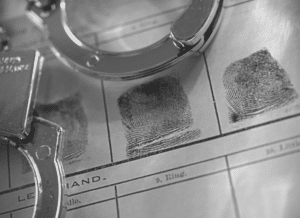
Conspiracy Charges in NY
NYC Conspiracy Crime Lawyer Conspiracy charges in NY are valid when two or more parties make a clear agreement to engage in criminal activity. Under
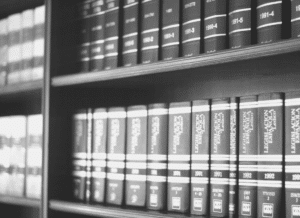
Federal Crimes Vs. State Crimes
Acts which are illegal under the laws of the United States federal government are known as federal crimes or federal offenses. Federal crimes are different

